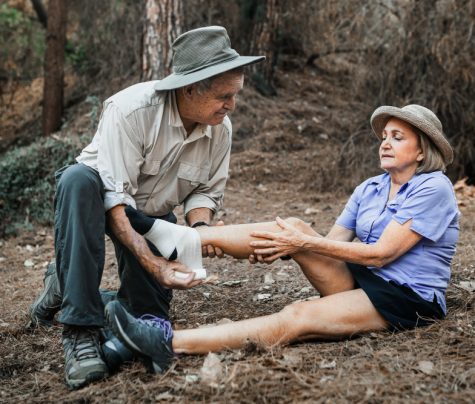
An injury can flip your whole day around in what, two seconds? And suddenly you’re trying to figure out what to do next while everything feels a little blurry. It’s wild how fast things go from “normal” to “wait… what now?”
Accidents don’t exactly give you time to prepare. One minute everything’s fine, and then your routine’s wrecked, bills start showing up (never just one bill, right?), and insurance people want answers you’re not even sure you have.
Most folks don’t realise how much those first few days matter. The little choices—what you write down, who you talk to, what you forget to do—can make a huge difference later.
Getting some basic steps right early on can save you stress, protect your rights, and honestly just make the rest of the process less of a nightmare.
Filing a personal injury claim isn’t some simple, “fill out this form and send it in” situation.
Personal Injury Law basics are more like a mix of remembering tiny details, keeping track of stuff you didn’t think you’d need, and trying to understand how the legal side works without losing your mind.
And for Texans, having someone who’s been through a million of these cases steer you a bit? That can keep the whole process from dragging on forever.
What Are The Personal Injury Law Basics Everyone Must Know?
As I have mentioned, here are the basics. Of course, when you consult professional help, they will be able to guide you better. They will tell you what you need to do, BEYOND these steps:
1. Start With Strong Documentation
If there’s one thing every claim lives or dies by, it’s evidence. No evidence… no case. So here’s what to focus on, even if you’re tired or stressed or just want the whole thing to be over already:
- Accident Details: Write down exactly what happened. Doesn’t have to be pretty—just dates, times, who said what, the order of things. Even weird little details might matter later.
- Medical Records: Keep every scrap the doctor gives you. Notes, prescriptions, test results, follow-ups… toss them in a folder. They show how the injuries actually affected you.
- Photos and Videos: Don’t overthink it—just take pictures of injuries, damaged stuff, and the scene. A bunch of angles helps.
- Receipts and Expenses: Anything you spend because of the accident, save it. No one remembers everything months later.
- Witness Information: If someone saw the whole thing, grab their contact info. A couple of sentences from them can seriously strengthen a claim.
At this stage, it can be helpful to contact Suits & Boots personal injury lawyers. They understand exactly which evidence is most important and how to organize it to make your claim stronger.
2. Timing Can Affect The Outcome
With personal injury claims, dragging your feet can accidentally tank your case. Some people wait because they feel “okay-ish,” or they’re overwhelmed, but timing really does matter:
- Medical Attention: Go get checked out right away. Besides helping you, it shows the injury is connected to the accident—not something you made up later.
- Accident Reports: Let police and your insurer know what happened sooner rather than later. Waiting makes everything murkier.
- Legal Deadlines: Texas has strict time limits for filing. Miss one and, well… that’s it.
- Early Legal Advice: Talking to a lawyer early prevents tiny mistakes you don’t even realise are mistakes.
Quick action doesn’t fix everything, but it stops those “ugh, I should’ve done that earlier” problems that pop up later.
3. Communication And Strategy Matter
It’s not just what you do—it’s how you talk about it, how you keep things organised, and how you handle the back-and-forth. A few things that help:
- Stick to Facts: Don’t guess or fill in blanks when talking to insurance companies. Just say what you’re sure about.
- Document Everything: Keep emails, texts, screenshots… whatever. It’s annoying, but it pays off.
- Organise Evidence Clearly: Even a simple binder or folder works. It just helps your claim make sense to someone who wasn’t there.
- Settlement vs. Court: Know the basic difference. One’s faster, one might get you more—depends on the case.
A clear approach, even a loose one, makes your chances a lot better.
Understand Personal Injury Law Basics With Professional Legal Support
Handling a personal injury claim without guidance can be overwhelming. Lawyers provide experience and insight that simplify the process. They can:
- Look over everything you’ve collected
- Point out which evidence actually matters
- Handle the insurance company (which is worth its weight in gold)
- Make sure forms are filed correctly
- Go to court if it comes to that
Legal help isn’t about making things fancy. It’s about keeping you from accidentally hurting your own case while you’re just trying to recover.
Personal Injury Law Basics: What Are The Steps to Take Immediately?
Note these down. Read and understand these steps extremely well. These will let you help yourself and others during such cases.
- Firstly, you must write down everything you can remember about what happened.
- Secondly, you must keep every medical bill. Additionally, you should keep a track of all the repair receipts. In fact, you must have a record of basically anything you paid for.
- Thirdly, you must get witness names. Also, try your best to get their numbers as well.
- Consequently, don’t give insurance companies long statements without legal advice
- Finally, you need to set up a consultation with an experienced lawyer early
Even one missing detail can mess with your claim later. Staying organised (even loosely) keeps you on solid ground.
The Personal Injury Law Basics Explained
A personal injury can blow up your day or your week—or more—but what happens afterwards depends a lot on the steps you take.
Keeping good records, acting sooner than later, and understanding the process can seriously influence the outcome.
And if you’re in Texas, having people you trust matters too. Reaching out to Suits & Boots personal injury lawyers is one of the easiest ways to make sure your claim is handled properly, your rights aren’t ignored, and someone’s actually helping you through the messy parts.
Taking action early, staying reasonably organised, and working with people who know what they’re doing can completely change how things turn out.
It makes recovery less about paperwork and more about actually healing.
Read Also:
- 5 Top Mistakes To Avoid After Experiencing A Personal Injury
- Personal Injury Law 101: How to Win the Case and Get Compensated!
- 5 Reasons Why You Should Consider Changing Your Personal Injury Attorney











0 Reply
No comments yet.